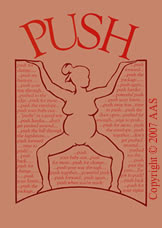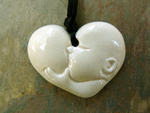Question: SO, if we know something affects the newborn, do we not know then that this human has been affected for life?
Again, I proclaim that the medical establishment and Doctors are to be held accountable for conducting research and PROVING and ENSURING the safety of drugs and medical interventions PRIOR TO USING THEM AND WIDELY PROMOTING THEM AS SAFE.
This after-the-fact is BS.
Anti-depressants Can Affect Newborns, Study Finds
By BENEDICT CAREY
Published: February 3, 2005
http://www.nytimes.com/2005/02/03/health/04depresscnd.html
n the wake of a yearlong debate over the risks of antidepressants to minors, a new analysis of World Health Organization medical records has found that infants whose mothers take the drugs while pregnant may suffer withdrawal symptoms shortly after they are born. The study challenges the assurances that many doctors have long given pregnant women with depression that taking the drugs would not affect their babies.
But experts said that the study, appearing today in the journal Lancet, was not definitive, and must be weighed against the benefits of drug treatment. Untreated maternal depression can also harm a developing fetus, the experts said, and may lead to lasting childhood problems, whereas all of the infants in the study recovered completely within 24 hours.
"This study is important in that it gives us a red flag that babies exposed to antidepressants during pregnancy should be closely observed, and may go through unusual behaviors at first," said Dr. Timothy Oberlander, a developmental pediatrician at the University of British Columbia who was not involved in the research. He does no research or consulting for pharmaceutical companies.
Some 10 percent to 15 percent of women suffer bouts of despair during the hormonal chaos of pregnancy, and about a quarter of them get antidepressant treatment, doctors estimate, usually with drugs like Prozac, from Eli Lilly; Paxil, from GlaxoSmithKline; and Zoloft, by Pfizer. If not treated, these women may also be at increased risk of post-partum depression, a devastating disorder that not only clouds the relationship between mother and child but can interfere with the child's social development, according to Dr. Janet DiPietro, a professor at the Johns Hopkins School of Public Health.
In the new study, researchers in Spain and Sweden searched through a large electronic database of adverse drug reactions stored in Uppsala, Sweden, maintained by the W.H.O. since 1968. They looked for reports of newborns who were exposed in utero to antidepressants, and who had symptoms after birth that included heightened agitation, fever and quickened breathing.
Psychiatrists have long observed these kinds of reactions in adults who abruptly stop taking certain antidepressants, and a few recent smaller studies have also noted similar symptoms in infants born to mothers who have been taking antidepressants. The European researchers found more than 100 such cases, and narrowed those to 93 that could be linked strongly to any antidepressant medication, based on a reading of the treating doctors' original reports. After conducting a statistical analysis based in part on W.H.O. estimates of drug usage, the authors concluded that the withdrawal reports were more common than would be expected by chance - and should be published, to alert doctors and patients.
In 13 of the 93 cases, the study found, infants suffered convulsions, a reaction that has not been widely noted in people who discontinue antidepressant use.
"All we are saying is that the data we have points to the possibility of withdrawal problem, but we would have to investigate each case closely to determine the overall risk," Dr. Emilio Sanz, of La Laguna Medical School in the Canary Islands, Spain, the paper's lead author, said in a telephone interview.
That newborns would show some reaction to a months-long course of mood-changing medication is not surprising to many doctors. The most widely prescribed antidepressants, called selective-serotonin reuptake inhibitors, or S.S.R.I.'s, induce alterations in the sensitivity of nerve cells, among other things; and abruptly stopping these drug forces the brain to readjust again, experts say.
"I can tell you that the newborn nurses here will not be surprised at these results," said Dr. DiPietro. "They have a term for it: S.S.R.I. syndrome," which includes jitteriness and agitation.
The antidepressant most often linked to reported withdrawal effects in the study was Paxil, a potent agent that is cleared more quickly from the body than similar drugs. Dr. Sanz said the withdrawal signal was stronger for Paxil but acknowledged that factors unrelated to the drug's chemistry - its prescription rate, for example - could also have accounted for the difference.
"Our monitoring so far has not provided clear evidence that Paxil causes neonatal complications," said Mary Anne Rhyne, a spokeswoman for Glaxo. The Food and Drug Administration asked antidepressant manufacturers to list possible neonatal complications on product labels more than a year ago, after infants in small studies exposed to the drugs suffered respiratory distress, irritability and seizures, among other troubles. It was not yet clear whether the new study will add to these cautions, an agency spokesperson said.
Some experts said that severe maternal depression during or after pregnancy is still a larger threat to a child's well being than the often mild and transient effects from discontinuing a drug.
"But for the worried well, for women who want antidepressants to feel better as opposed to treating serious depression," Dr. DiPietro said, "they may want to ask whether the benefit they are getting outweighs the potential risks to the developing child."
The Other Side of the Glass
Part One was officially released June 2013 in digital distribution format.
To purchase to to www.theothersideoftheglass.com
If you were a donor and want to download your copy send an email to theothersideoftheglassfilm@gmail.com.
The trailer
Sunday, November 26, 2006
Subscribe to:
Post Comments (Atom)
"Soft is the heart of a child. Do not harden it."
A public awareness reminder that things that happen behind the scenes, out of our sight, aren't always as rosy as we might think them to be. Perhaps its a restaurant cook who accidentally drops your burger
on the floor before placing it on the bun and serving it to you. Here it's an overworked apathetic (pathetic) nurse giving my newborn daughter her first bath.
Please comment and rate this video, so as to insure that it is viewed as widely as possible, perhaps to prevent other such abuse. -- The mother who posted this YouTube. How NOT to wash a baby on YouTube
Are you going to try to tell me that "babies don't remember?" There is no difference to this baby's experience and the imprinting of her nervous system/brain and one that is held and cleaned by the mother or father either at the hospital or at home?
By the way, this is probably NOT the baby's first bath. The nurse is ungloved. Medical staff protocol is that they can't handle a baby ungloved until is has been bathed (scrubbed if you've seen it) because the baby is a BIO-HAZARD -- for them. Never mind that the bio-hazard IS the baby's first line of defense against hospital germs.
Missouri Senator Louden Speaks
Finally, A Birth Film for Fathers
Part One of the "The Other Side of the Glass: Finally, A Birth Film for and about Men" was released June, 2013.
Through presentation of the current research and stories of fathers, the routine use of interventions are questioned. How we protect and support the physiological need of the human newborn attachment sequence is the foundation for creating safe birth wherever birth happens.
Based on knowing that babies are sentient beings and the experience of birth is remembered in the body, mind, and soul, fathers are asked to research for themselves what is best for their partner and baby and to prepare to protect their baby.
The film is designed for midwives, doulas, and couples, particularly fathers to work with their caregivers. Doctors and nurses in the medical environment are asked to "be kind" to the laboring, birthing baby, and newborn. They are called to be accountable for doing what science has been so clear about for decades. The mother-baby relationship is core for life. Doctors and nurses and hospital caregivers and administrators are asked to create protocols that protect the mother-baby relationship.
Men are asked to join together to address the vagaries of the medical system that harm their partner, baby and self in the process of the most defining moments of their lives. Men are asked to begin to challenge the system BEFORE they even conceive babies as there is no way to be assured of being able to protect his loved ones once they are in the medical machine, the war zone, on the conveyor belt -- some of the ways that men describe their journey into fatherhood in the medicine culture.
Donors can email theothersideoftheglassfilm@gmail.com to get a digital copy.
Through presentation of the current research and stories of fathers, the routine use of interventions are questioned. How we protect and support the physiological need of the human newborn attachment sequence is the foundation for creating safe birth wherever birth happens.
Based on knowing that babies are sentient beings and the experience of birth is remembered in the body, mind, and soul, fathers are asked to research for themselves what is best for their partner and baby and to prepare to protect their baby.
The film is designed for midwives, doulas, and couples, particularly fathers to work with their caregivers. Doctors and nurses in the medical environment are asked to "be kind" to the laboring, birthing baby, and newborn. They are called to be accountable for doing what science has been so clear about for decades. The mother-baby relationship is core for life. Doctors and nurses and hospital caregivers and administrators are asked to create protocols that protect the mother-baby relationship.
Men are asked to join together to address the vagaries of the medical system that harm their partner, baby and self in the process of the most defining moments of their lives. Men are asked to begin to challenge the system BEFORE they even conceive babies as there is no way to be assured of being able to protect his loved ones once they are in the medical machine, the war zone, on the conveyor belt -- some of the ways that men describe their journey into fatherhood in the medicine culture.
Donors can email theothersideoftheglassfilm@gmail.com to get a digital copy.
Buy the film at www.theothersideoftheglass.com.
The film focuses on the male baby, his journey from the womb to the world and reveals healing and integrating the mother, father, and baby's wounded birth experience. The film is about the restoring of our families, society, and world through birthing loved, protected, and nurtured males (and females, of course). It's about empowering males to support the females to birth humanity safely, lovingly, and consciously.
Finally, a birth film for fathers.
The film focuses on the male baby, his journey from the womb to the world and reveals healing and integrating the mother, father, and baby's wounded birth experience. The film is about the restoring of our families, society, and world through birthing loved, protected, and nurtured males (and females, of course). It's about empowering males to support the females to birth humanity safely, lovingly, and consciously.
Finally, a birth film for fathers.
What People Are Saying About the FIlm
Well, I finally had a chance to check out the trailer and .. wow! It's nice that they're acknowledging the father has more than just cursory rights (of course mom's rights are rarely acknowledged either) and it's great that they're bringing out the impact of the experience on the newborn, but I'm really impressed that they're not shying away from the political side.
They are rightly calling what happens in every American maternity unit, every day, by its rightful name - abuse. Abuse of the newborn, abuse of the parents and their rights, abuse of the supposedly sacrosanct ethical principal of patient autonomy and the medico-legal doctrine of informed consent, which has been long ago discarded in all but name. I love it!
In the immortal words of the "shrub", "bring it on!" This film needs to be shown and if I can help facilitate or promote it, let me know.
Father in Asheville, NC
Thanks for sharing this. It was very touching to me. I thought of my brother-in-law standing on the other side of the glass when my sister had to have a C-section with her first child because the doctor was missing his golf date. I'll never forget his pacing back and forth and my realizing that he was already a father, even though he hadn't been allowed to be with his son yet.
Margaret, Columbia, MO
They are rightly calling what happens in every American maternity unit, every day, by its rightful name - abuse. Abuse of the newborn, abuse of the parents and their rights, abuse of the supposedly sacrosanct ethical principal of patient autonomy and the medico-legal doctrine of informed consent, which has been long ago discarded in all but name. I love it!
In the immortal words of the "shrub", "bring it on!" This film needs to be shown and if I can help facilitate or promote it, let me know.
Father in Asheville, NC
OMG'ess, I just saw the trailer and am in tears. This is so needed. I watch over and over and over as fathers get swallowed in the fear of hospitals birth practice. I need a tool like this to help fathers see how very vital it is for them to protect their partner and baby. I am torn apart every time I see a father stand back and chew his knuckle while his wife is essentially assaulted or his baby is left to lie there screaming.
Please send me more info!!!!
Carrie Hankins
CD(DONA), CCCE, Aspiring Midwife
720-936-3609
Thanks for sharing this. It was very touching to me. I thought of my brother-in-law standing on the other side of the glass when my sister had to have a C-section with her first child because the doctor was missing his golf date. I'll never forget his pacing back and forth and my realizing that he was already a father, even though he hadn't been allowed to be with his son yet.
Margaret, Columbia, MO
In case you don't find me here
Soon, I'll be back to heavy-duty editing and it will be quiet here again. I keep thinking this blog is winding down, and then it revives. It is so important to me.
I wish I'd kept a blog of my journey with this film this past 10 months. It's been amazing.
I have a new blog address for the film, and will keep a journal of simple reporting of the journey for the rest of the film.
www.theothersideoftheglassthefilm.blogspot.com
I'll be heading east this week to meet with a group of men. I plan to post pictures and clips on the film blog.
I'll keep up here when I can -- when I learn something juicy, outrageous, or inspiring related to making birth safer for the birthing baby.
I wish I'd kept a blog of my journey with this film this past 10 months. It's been amazing.
I have a new blog address for the film, and will keep a journal of simple reporting of the journey for the rest of the film.
www.theothersideoftheglassthefilm.blogspot.com
I'll be heading east this week to meet with a group of men. I plan to post pictures and clips on the film blog.
I'll keep up here when I can -- when I learn something juicy, outrageous, or inspiring related to making birth safer for the birthing baby.
Review of the film
Most of us were born surrounded by people who had no clue about how aware and feeling we were. This trailer triggers a lot of emotions for people if they have not considered the baby's needs and were not considered as a baby. Most of us born in the US were not. The final film will include detailed and profound information about the science-based, cutting-edge therapies for healing birth trauma.
The full film will have the interviews of a wider spectrum of professionals and fathers, and will include a third birth, at home, where the caregivers do a necessary intervention, suctioning, while being conscious of the baby.
The final version will feature OBs, RNs, CNMs, LM, CPM, Doulas, childbirth educators, pre and perinatal psychologists and trauma healing therapists, physiologists, neurologists, speech therapists and lots and lots of fathers -- will hopefully be done in early 2009.
The final version will include the science needed to advocated for delayed cord clamping, and the science that shows when a baby needs to be suctioned and addresses other interventions. Experts in conscious parenting will teach how to be present with a sentient newborn in a conscious, gentle way -- especially when administering life-saving techniques.
The goal is to keep the baby in the mother's arms so that the baby gets all of his or her placental blood and to avoid unnecessary, violating, and abusive touch and interactions. When we do that, whether at home or hospital, with doctor or midwife, the birth is safe for the father. The "trick" for birthing men and women is how to make it happen in the hospital.
The full film will have the interviews of a wider spectrum of professionals and fathers, and will include a third birth, at home, where the caregivers do a necessary intervention, suctioning, while being conscious of the baby.
The final version will feature OBs, RNs, CNMs, LM, CPM, Doulas, childbirth educators, pre and perinatal psychologists and trauma healing therapists, physiologists, neurologists, speech therapists and lots and lots of fathers -- will hopefully be done in early 2009.
The final version will include the science needed to advocated for delayed cord clamping, and the science that shows when a baby needs to be suctioned and addresses other interventions. Experts in conscious parenting will teach how to be present with a sentient newborn in a conscious, gentle way -- especially when administering life-saving techniques.
The goal is to keep the baby in the mother's arms so that the baby gets all of his or her placental blood and to avoid unnecessary, violating, and abusive touch and interactions. When we do that, whether at home or hospital, with doctor or midwife, the birth is safe for the father. The "trick" for birthing men and women is how to make it happen in the hospital.








2 comments:
The Food and Drug Administration asked antidepressant manufacturers to list possible neonatal complications on product labels more than a year ago, after infants in small studies exposed to the drugs suffered respiratory distress, irritability and seizures, among other troubles.
I have seen a baby with respiratory distress after gestating on Zoloft. Not something I'd like to see again.
The Food and Drug Administration asked antidepressant manufacturers to list possible neonatal complications on product labels more than a year ago, after infants in small studies exposed to the drugs suffered respiratory distress, irritability and seizures, among other troubles.
I have seen a baby with respiratory distress after gestating on Zoloft. Not something I'd like to see again.
Post a Comment